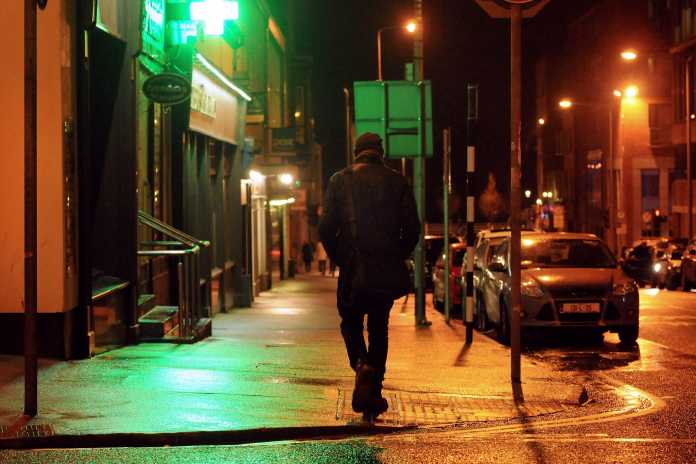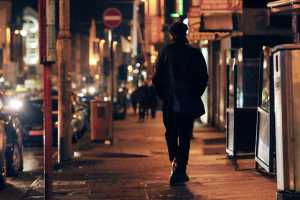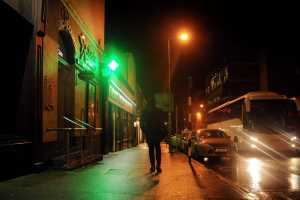
WITH the latest Government figures indicating that 252 people are now homeless in Limerick, Alan Jacques revisited the city’s streets for a night to get an insight into this issue.

I am grateful to have a roof over my head, rented or otherwise. But with the skyward trajectory rents are currently taking, it is hard not to worry about losing your home. It is now natural in 2017 for those of us who do not have the security of owning our own property to feel vulnerable.
The current housing crisis brings it home to us in no uncertain terms that homelessness can happen to anyone.
I earn a modest wage and work two jobs to provide for my children and myself.
I earn just about enough to pay the rent and bills, keep my car on the road and make sure my kids don’t go without. Most of what I earn simply goes on the costs of keeping us in a home. There is little left over.
It’s hand to mouth and just scraping by from week to week, same as it is for most hardworking Irish families. You do what you have to do, but worrying about what tomorrow brings is a natural part of the day for most ordinary folk in this day and age.
Don’t get me wrong, I am very grateful for all I have and count myself most fortunate. But amid constant reports of rising rents and a worsening homelessness crisis, more and more Irish people are now faced with the cold harsh reality of this terrifying plight.
These are frightening times for those looking to the rental market to provide them with secure accommodation. There are fewer properties to rent — fewer every day. Rents continue to rise and, for most people, the fear of being left without a roof over their heads is very real indeed. People are terrified that the homes they are now renting will be sold from under them or their rent will be hiked to levels they can no longer afford. There is no security.
Christmas has come and gone and homelessness is an issue that tends to slip out of the media’s consciousness once the New Year kicks in. But for those who go to sleep worrying about losing their homes, or indeed trying to find one, it still remains a very real and frightening prospect.
The latest Department of Housing Homeless Report will help keep homelessness in the headlines for now. It showed that the total number of people experiencing homeless in Ireland this January was 7,167 compared to 7,148 in December — and a rise of a quarter since this time last year (5,715).
The figures for Limerick showed that there were 257 people homeless last December with a small decrease in January 2017, seeing the numbers down to 252.
The same report showed that there were 39 families including 86 children homeless in Limerick during the Christmas period. The total number of homeless families across Ireland is still up by a third on this time last year from 884 to 1,172 with huge numbers of families still losing their homes every day.
There are little real signs of this crisis improving. If anything, it’s worse it is getting.
Among the destitute souls
I spent a night sleeping rough in Limerick in mid-February and was struck by the large numbers of destitute souls on the city’s streets.
I don’t think I’ve ever seen so many homeless people in around the city centre. I felt their ostracised presence on every street I walked. They stand out like a sore thumb, one that no bandage can cover up nor cure.
On O’Connell Street, the city’s main thoroughfare, the homeless are out in force. I see them on every corner. They rest in doorways, beg, drink cheap booze, anything to while away the hours until they return to the sanctuary of the hostels and emergency accommodation for another night. They are out here just killing time on the streets of Limerick, lost to drink, drugs and whatever else helps them get through another miserable day.
And who could blame them?
During my 12-hour stint on the streets, I experienced the same mindless drudgery. There is too much time out here for idle hands to fill. I walked the streets from 5pm on a Wednesday evening and eventually began to experience the brain drain this can cause.
I questioned everything. I viewed the world with mistrust from the corner of my eye and simply wanted nothing more than to escape this situation.
Of course this was something I could do at any given moment if I so wished. I am not homeless, but I constantly berated myself for wanting to give up, wanting to go home and for being out here at all.
“Why are you doing this? What are you hoping to achieve? Why don’t you just go home?” I asked myself.

Too much time locked inside our own heads is not good and, as the evening wore on, I started to feel the strain. There were moments I felt lonely and afraid, but mostly I just felt alone.
I thought much during the night about my friend Vedran, a 37-year-old homeless man who lived on the streets of Limerick for seven months before his untimely death in November 2015.
I decided to take a walk down by the riverbank to where this larger than life Croatian adventurer had lived in a makeshift camp. I felt a great pang of sadness as I remembered the last time I was here with Vedran and seeing his wet clothes hanging from tree branches and books lying soiled in the muddy ground.
The site was now completely overgrown, but I felt Vedran’s presence with me for the rest of the night as I walked the city’s streets. I smiled as I remembered him fawning over ‘X-Files’ actress Gillian Anderson, whom he had a mind-bending crush on. I was glad of his company and to have his memory so alive as I walked his old beat.
Shelter on Lord Edward Street
At 8.45pm I visited the Winter Beds Initiative up on Lord Edward Street, which is run by Novas, Limerick’s largest homeless provider. Operated in conjunction with Limerick City and County Council, this 15-bed facility opened last December in an effort to address a direct spike in rough sleeping across the city.
It is just one of a range of services provided by Novas to homeless people during the cold spell. It will remain open until the end of March.
The safe and warm atmosphere immediately struck me as soon as I stepped inside. Volunteers were preparing food for the city’s homeless, those most in need of an emergency bed on another cold wet night. The place was a hive of activity. A football match blared from the TV in the living area, only adding to the homely vibe.
By 9pm people were arriving right on cue and were eager to settle in for the night. Looking worn and exhausted, most made a direct beeline for the kettle to make hot drinks and strengthen their resolve after another day out in the elements. This humble refuge had all the feel of a home for those who needed it most. It soon filled with the sound of chatter and laughter.
I spoke to Communications Manager, Una Burns, who was volunteering at the hostel the night I visited. She described the Winter Beds Initiative to me as a “humanitarian response to the immediate crisis. We do not consider this service as a long-term solution and our Housing First Team are working tirelessly with residents there to find long-term housing with support”.
Burns stated that while the issue of homelessness is a complex one, the root cause of such an increase is a dearth of housing supply in the city.
“Single households and families are hindered from moving on from homelessness by the utter lack of accommodation in the private rented market,” she told me.
After a bite to eat, a bit of banter and some time chilling out in front of the TV, the inhabitants of the Winter Beds Initiative started to drift off to their beds. Safe and sound from the elements and the treachery of life on the streets, they could now sigh a breath of relief — another wretched day down.
One homeless man I spoke to at the shelter told me how grateful he was for a bed for the night.
“It is impossible to sleep out on the streets. You never know who is going to come up on you or what might happen. One night recently, I stayed awake all night. I just sat outside a 24-hour garage the whole time. I was too frightened to close my eyes.”
Taking my leave, I decided it was time to start thinking about where I would lay my own head for the night. As I walked down the town with a sleeping bag and cardboard boxes under my arm I drew suspicious and pitying looks from passers-by. The city was buzzing. Restaurants, pubs and takeaways were teeming with life and by 10pm the aromas wafting through the air had my tummy rumbling. I hadn’t eaten since lunchtime.
‘I’d kill for a snack box about now,” I thought to myself as I passed The Chicken Hut. But I pushed the hunger from my mind and kept on the move.
Denizens of the night
Two men had set up camp outside Brown Thomas and were lying on cardboard boxes, blankets and a duvet, which would be their bed for the night. As I approached them they smiled and gestured me away, making it clear they wished to be left in peace.
Soon after I met a 25-year-old homeless man from County Limerick who was on his way to stay with a friend in the city. He told me he felt “lonely, frightened and trapped” by his current situation. Homeless for almost a year, this despondent young man had been threatened on the streets, used drugs as an escape and now longed to get his life back on track. Wary of me, he described his life as “hellish” and looked lost and cold as he skulked up the street. I prayed that things would eventually come good for him.
Further down the town, I met a young man begging on Little Ellen Street at around 10.30pm. I gave him what little change I had in my pocket but he too made it clear he did not want to engage in conversation with me. Like the pair I had met on O’Connell Street, he just smiled politely and waved me on.

I walked up Henry Street to take a closer look at some of the possible spots I had taken a mental note of earlier that evening. I felt it would be best to find somewhere away from the hustle and bustle of city nightlife, where I would be less likely to draw attention to myself.
As it turns out I’m not as street smart as I would have myself believe. The further away from the city centre I got, the fewer people I met and the more I stuck out and the more isolated I became.
I also noticed that some of the characters I passed on these poorly lit backstreets appeared shady at best. After a few failed attempts to put my head down in dark doorways, I was soon convinced that I would be looking for real trouble if I didn’t move on. I did not feel safe at all.
I quickly understood why those sleeping rough on the streets of Limerick did not feel comfortable when strangers approached.
I headed back down the town and decided to just keep moving for a while. At least this would keep me warm.
Things were getting more colourful and the weirdos were more abundant as the night pressed on. I felt vulnerable and foolish being out here alone.
One young man under the influence of drink and pumped up on bravado got all up in my face as he showed off to his friends on William Street. My heart started to pound madly.
“Well, bud,” he shouted, cocking his head at me.
He momentarily blocked my path and threw threatening shapes and glances before heading off with his chortling pals. I felt relieved.
Around 11.30pm the two men I passed earlier outside Brown Thomas now appeared to be fast asleep. Between the noise of the traffic, the whoops of drunken revellers and the glare of the shop-front lights, I wondered how they managed to block it all out. Where was the solace?
Over on Thomas Street, a street drinker absorbed by the music blasting from a nearby bar swayed wildly. Grinning from ear to ear, he was oblivious to all going on around him, lost in his own little world.
Living on your wits
By midnight, my bones ached and every step made me feel wearier but it was the mental strain that I found most exhausting of all.
You live on your wits out on the street, and switching off is not a real option. You sleep with one eye open, if you are lucky to sleep at all. You are constantly looking over your shoulder and watching every approaching stranger with apprehension and caution.
I moved from doorway to doorway all night. I never felt safe and rest never came. I was cold, wet and miserable. I felt broken by the experience.
At about 1am, sitting hunched in the darkness I was startled by a drunkard singing tunelessly as he urinated on a wall not a stone’s throw from where I hid. I was getting more freaked out as the minutes passed and just wanted to be at home.
Being lucky enough to have a home to return to though meant more to me with every passing minute as I walked the cold dank streets in these early hours. I would never take it for granted again.
Sleet and rain fell sporadically throughout the night and an icy chill entered my bones that stayed with me long after I got home the next day. It took me some time to warm up, but I was grateful to have made it through unscathed.
My experience on the streets stayed with me. I felt haunted for days afterwards. It had only been one night but it had left its mark on me. The misery of this one night made an indelible impression that makes me shudder still when I look back on it.
My night out on the city’s streets made me see that as difficult and uncertain as things are for many Irish families right now, there are pour souls, castaways, out there who have it far worse. They have absolutely nothing, not even hope.
I felt guilty and selfish for my own fears and anxieties, which seemed inconsequential in comparison, but in 2017 homelessness is indeed a very frightening prospect that more and more Irish people are having to face.
As I walked the streets of Limerick on a dirty February night I learned that to look a homeless man in the eye is to see real poverty, real despair.
This realisation made me feel angry and sad. Surely, I thought to myself, it’s high time our Government stopped averting their gaze and tackled the scourge of homelessness.
As a wise French man once said, “It is not only for what we do that we are held responsible, but also for what we do not do.”
by Alan Jacques


